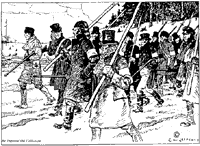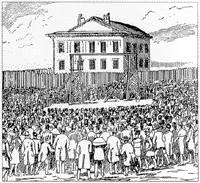1830's
In the 1830's , elected officials sat in an assembly, but had little power over the crown representatives led by the Lieutenant-Governor General. The government of the day was described as the "Family Compact", appointed by patronage, with strong British Tory connections, favoured in all dealings -- especially in the granting of land for military service.
The common people had their champion in William Lyon Mackenzie. As publisher of the Colonial Advocate, and captivating speaker, Mackenzie defended the cause of the immigrant farmer. By the mid 1830's, Mackenzie, mayor of the renamed Toronto, and a member of the elected Assembly, spoke throughout the colony about responsible government and even rebellion. Several meetings were held at Thompson's Tavern in Pickering Township, and no doubt the Wixsons were there. They supported Mackenzie in his showdown with the British.
Wixson farms: 1837
 When
rebellion broke out in Lower Canada, Mackenzie gathered his followers,
Wixsons included, and led them to Montgomey's Tavern on Yonge Street. They
numbered 800. On December 4, 1837, armed with pitch forks and rifles, they
marched south to destroy the Don Bridge, cutting off government reinforcements
from Scarborough, and then execute a coup in Toronto.
When
rebellion broke out in Lower Canada, Mackenzie gathered his followers,
Wixsons included, and led them to Montgomey's Tavern on Yonge Street. They
numbered 800. On December 4, 1837, armed with pitch forks and rifles, they
marched south to destroy the Don Bridge, cutting off government reinforcements
from Scarborough, and then execute a coup in Toronto.
They were turned back by fore-warned militia, disarmed and arrested. Mackenzie escaped and headed for New York State. Five Wixsons were captured and charged: Randal, Elder in the Baptist Church (age 38), and brother Townsend (age 36), their cousins Asa (age 36), Joel (age 34) and Joshua Wixson Junior (age 27).
1837
Asa and Joel were found guilty and banished from the province for life.
Randal was found guilty, but was sentenced to transportation to Tasmania (then called Van Dieman's Land) for 14 years. Randal's petition to the court in April 1838 stated he only spread information and did not take up arms himself. According to historians, Randal had a long association with Mackenzie, having edited the Colonial Advocate in 1832 while Mackenzie was in England. Randal claimed he attended a public meeting the week before the march where Mackenzie explained that action was required to protect Upper Canada from the rebillious French in Lower Canada. Randal told his neighbours, and they attended Mackenzie's march to Toronto secure in the thought that they represented a province united in its desire for new government. This was in fact shown to be a false assumption, and many others realized Mackenzie had lied about the popular backing. Read Randal's petition dated 10 April 1838 (11).
Randal was taken to England in the fall of 1838, and was held at London in Newgate Prison while he and several others made an appeal to the British Government. They were eventually released on the condition that they not return to Upper Canada. Read Randal's letter to his father written at Newgate in June and July, 1839.
In January of 1838, Joshua Jr. was discharged by the commission after examination. In May, Townsend was pardoned on security for good behaviour and put on probation for 3 years. Joseph Sr. had been accused of "patriot" activities in February of 1838, but the grand jury ignored the indictment based on the dubious charater of the witness (12). Joseph was active in the political union movement as a reformer, and even attended the gathering at Montgomery's tavern with Peter Mathews. Though he was never charged for his part in 1837, Mathews died in a public execution the next spring.
 It
was said that the actions of the Lord Durham, temporary Governor General
after the rebellion, saved many rebels from execution. As it was, several
were hung in Toronto, but more were banished by Durham and the British
reprimanded him for his leniency. Durham's legacy, however, lived longer
than those saved from the noose. In 1840, Queen Victoria pronounced Upper
and Lower Canada to be one Province of Canada. The "Compact" was out, representative
government was in, and within the decade the crown representatives become
mere figure-heads.
It
was said that the actions of the Lord Durham, temporary Governor General
after the rebellion, saved many rebels from execution. As it was, several
were hung in Toronto, but more were banished by Durham and the British
reprimanded him for his leniency. Durham's legacy, however, lived longer
than those saved from the noose. In 1840, Queen Victoria pronounced Upper
and Lower Canada to be one Province of Canada. The "Compact" was out, representative
government was in, and within the decade the crown representatives become
mere figure-heads.